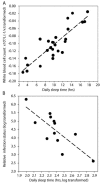Parasite resistance and the adaptive significance of sleep
- PMID: 19134175
- PMCID: PMC2631508
- DOI: 10.1186/1471-2148-9-7
Parasite resistance and the adaptive significance of sleep
Abstract
Background: Sleep is a biological enigma. Despite occupying much of an animal's life, and having been scrutinized by numerous experimental studies, there is still no consensus on its function. Similarly, no hypothesis has yet explained why species have evolved such marked variation in their sleep requirements (from 3 to 20 hours a day in mammals). One intriguing but untested idea is that sleep has evolved by playing an important role in protecting animals from parasitic infection. This theory stems, in part, from clinical observations of intimate physiological links between sleep and the immune system. Here, we test this hypothesis by conducting comparative analyses of mammalian sleep, immune system parameters, and parasitism.
Results: We found that evolutionary increases in mammalian sleep durations are strongly associated with an enhancement of immune defences as measured by the number of immune cells circulating in peripheral blood. This appeared to be a generalized relationship that could be independently detected in 4 of the 5 immune cell types and in both of the main sleep phases. Importantly, no comparable relationships occur in related physiological systems that do not serve an immune function. Consistent with an influence of sleep on immune investment, mammalian species that sleep for longer periods also had substantially reduced levels of parasitic infection.
Conclusion: These relationships suggest that parasite resistance has played an important role in the evolution of mammalian sleep. Species that have evolved longer sleep durations appear to be able to increase investment in their immune systems and be better protected from parasites. These results are neither predicted nor explained by conventional theories of sleep evolution, and suggest that sleep has a much wider role in disease resistance than is currently appreciated.
Figures


Similar articles
-
Coevolutionary feedback elevates constitutive immune defence: a protein network model.BMC Evol Biol. 2016 May 5;16:92. doi: 10.1186/s12862-016-0667-3. BMC Evol Biol. 2016. PMID: 27150135 Free PMC article.
-
Immunoendocrine mechanisms associated with resistance or susceptibility to parasitic diseases during pregnancy.Neuroimmunomodulation. 2009;16(2):114-21. doi: 10.1159/000180266. Epub 2009 Feb 11. Neuroimmunomodulation. 2009. PMID: 19212131 Review.
-
Mathematical models of parasite responses to host immune defences.Parasitology. 1997;115 Suppl:S155-67. doi: 10.1017/s003118209700200x. Parasitology. 1997. PMID: 9571700 Review.
-
Mucosal microbial parasites/symbionts in health and disease: an integrative overview.Parasitology. 2019 Aug;146(9):1109-1115. doi: 10.1017/S0031182019000647. Parasitology. 2019. PMID: 31378213 Free PMC article.
-
[Parasitism--the existence of organisms as a component of parasitic systems].Parazitologiia. 1998 Jan-Feb;32(1):3-10. Parazitologiia. 1998. PMID: 9612817 Review. Russian.
Cited by
-
Tapeworm infection affects sleep-like behavior in three-spined sticklebacks.Sci Rep. 2024 Oct 8;14(1):23395. doi: 10.1038/s41598-024-73992-7. Sci Rep. 2024. PMID: 39379533 Free PMC article.
-
Oxygen consumption rate of flatworms under the influence of wake- and sleep-promoting neurotransmitters.J Exp Zool A Ecol Integr Physiol. 2024 Dec;341(10):1130-1136. doi: 10.1002/jez.2828. Epub 2024 May 27. J Exp Zool A Ecol Integr Physiol. 2024. PMID: 38801005 Free PMC article.
-
Restless nights when sick: ectoparasite infections alter rest-activity cycles of diurnal fish hosts.Parasitology. 2024 Mar;151(3):251-259. doi: 10.1017/S0031182023001324. Epub 2023 Dec 15. Parasitology. 2024. PMID: 38372138 Free PMC article.
-
Persistence of Nocturnality in Decapitated and Bisected Flatworms.J Biol Rhythms. 2023 Jun;38(3):269-277. doi: 10.1177/07487304231158947. Epub 2023 Mar 24. J Biol Rhythms. 2023. PMID: 36960836 Free PMC article.
-
Why study sleep in flatworms?J Comp Physiol B. 2024 Jun;194(3):233-239. doi: 10.1007/s00360-023-01480-x. Epub 2023 Mar 11. J Comp Physiol B. 2024. PMID: 36899149 Free PMC article. Review.
References
-
- Elgar MA, Pagel MD, Harvey PH. Sleep in mammals. Anim Behav. 1988;36:1407–1419. doi: 10.1016/S0003-3472(88)80211-2. - DOI
Publication types
MeSH terms
Grants and funding
LinkOut - more resources
Full Text Sources
Other Literature Sources
Medical
Miscellaneous


